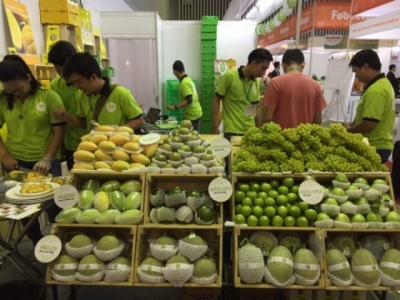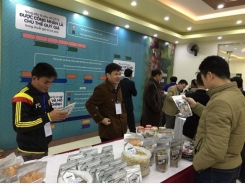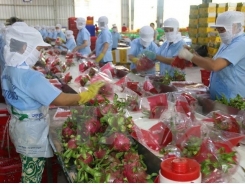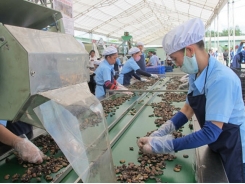Not let the clean agricultural products to be rescued

The lack of stability in supply, quality, the problems in the benefit sharing between the cooperatives and the enterprises along with the rampant production without concern for market demand is a constraint, so that, the combination of consuming the agricultural products in general and clean agricultural products have not achieved the expected results. It needs to solve these issues urgently to open up the agricultural market, end the rescue of the agricultural products as happened the last time.
The price of safe products has not matched the cost and effort that the facilities have invested. Photo: N.Hiền.
According to the statistics of the Ministry of Agriculture and Rural Development, there are 700 safe agricultural product supply chains that are connected among 50 provinces and cities nationwide, which the main products are vegetables, fruits, tea, meat and fish products of all kinds... However, compared with consumer demand, safe food and agricultural products have not diversified in terms of types, and have a lack of supply places that many consumers have not had the opportunity to access yet. Mr. Dao Van Ho, Director of the Center for Trade Promotion of Agriculture, Ministry of Agriculture and Rural Development assessed the connection between supply and demand for agricultural products and food safety was the weakest stage in the value chain of agricultural production.
Ms. Dinh Thi Phuong Khanh, Deputy Director of Department of Agriculture and Rural Development of Long An province said that from early 2015, the Long An Provincial People's Committee had implemented the Project on building and developing the supply chain models of agricultural food, fisheries and aquaculture in the area until 2020. Up to now, 4 production chains of safe vegetables have been built. However, the consumption of products controlled by this chain has encountered many difficulties in distributing, communicating and marketing. The layout of safe vegetable selling points in the market has still been difficult, the locations have not been favorable, so consumers have not accessed them much. In particular, in traditional markets, the price between safe and unsafe products had no difference, the price of safe products has not really matched the cost and effort that the facilities invested. Even the safe vegetables controlled by the chain under the VietGAP standards were also equated with the vegetables without origin and safe by the traders.
Mr. Pham Trung Kien, Deputy General Director of Saigon Co-op said that the company was now linking the distribution of clean agricultural products with 20 cooperatives to supply clean agricultural products to the consumers with annual sales up to 16,000 tons, and sales reaching more than VND 310 billion. However, the supply from the cooperatives was unstable, has failed to meet quality and quantity requirements, and the prices also fluctuated seasonally. According to Mr. Kien, although these cooperatives have the certification of VietGap or the safe production facilities, sometimes the quality control system of Saigon Co-op still found chemical residues, antibiotics, and bacteria in the products. In addition, the capacity of regulating the operation of cooperatives was still limited, leading to the participating status of cooperative members dependent on their demands. This lead to the scale of production, product productivity not being stable, and not being as satisfactory as the original commitment.
Discussing the status of "forming a party" in the chain of the agricultural products, Mr. Nguyen Phuc Khoa, Deputy General Director of Sai Gon Trading Company Limited (Satra) also mentioned the fact that the association of Satra with the farmers setting up the rice areas often encountered the problem that the farmers sold the products outside when the prices were up, but when the prices were down, Satra had to buy big quantities all of a sudden. Mr. Vo Quan Huy, Director of Huy Long An Co., Ltd also said that not only the farmers but also the enterprises “form a party” when it was disadvantageous to continue the contract. Consequently, the associated contract should have a third unit to ensure legal and fair trading conditions for both parties.
In order to increase the effectiveness of linkages between the enterprises and the cooperatives, Mr. Huy said that farmers had to change their thinking from producing agriculture to doing business in agriculture. They need to know that it would sell their products to all kinds of customers with the suitable quality standards. Ms. Dinh Thi My Loan, Chairman of the Vietnam Association of Retailers, said that the cooperatives needed to study and understand the market demand in order to have suitable production plans, avoid the over demand that had to be rescued in recent times.
Many opinions also suggested that the State should support the enterprises and the cooperatives to develop a chain for the introduction, distribution and consumption of agricultural products and safe food products for a cooperative linking mechanism. At the same time, the specialized areas for cultivating clean products should be planned to call for the investors to support the high-tech applications, promote the trade for exporting. At the managerial level, Deputy Minister of Agriculture and Rural Development, Tran Thanh Nam, said that the two main bottlenecks in the linkage of agricultural products were the quality of goods and the benefit sharing between the cooperatives and the enterprises. According to Mr. Nam, the cooperatives should not rely on the Government, should make their own efforts, should make good use of internal credit in combination with efficient production and business. In order to improve the competitiveness of cooperatives, in 2018, the Ministry of Agriculture and Rural Development will pilot the deployment of 400 scientific and technical staff for the cooperatives. This would help to supplement the technical human resources, support the cooperatives to improve productivity and product quality.
Mr. Nam also said that the Ministry of Agriculture and Rural Development was drafting a decree on policies to encourage the development of cooperation and linking in the production and consumption of the agricultural products. The Decree would overcome the shortcomings of Decision No. 62/2013/QD-TTg. Linking would be done on the principle of sharing benefits and risks, the offending party would not be entitled to the preferential policies. This is a part of the solution to support the production linkages to increase the competitiveness of Vietnamese agricultural products, protect the domestic market from the import wave of foreign agricultural products.
Ms. Nguyen Thi Anh Lan, Director of Tuong Lai Seafood Cooperative (HCMC):
Due to the small scale, the output is about 250-300 tons/year, the cooperative has difficulties participating in large distribution channels and must depend on the traders and distribute by itself on a small scale. It was difficult to expand the scale. In addition, due to the small scale, the cooperative faced many difficulties while having to solve many problems in terms of production, building standards of food hygiene and safety, and finding the consumption channels in supermarkets at the same time. Therefore, the main products are still sold through free channels on the market.
Mr. Vo Hoang Anh, Director of Private Label of HCMC Trade Union (Saigon Co.op):
The demand for organic food is increasing rapidly. The Saigon Co-op is investing the organic production in an area of 300 hectares, with the international certification. The products are sold at 7 supermarkets in the Ho Chi Minh City, but the supply is not enough to meet the needs of the market. Consequently, the Saigon Co-op is seeking partners to cooperate in production and trading of organic products that are certified internationally or invest in products to cover the output, ensuring the stable source of goods with good quantity, output and price.
Mr. Vo Minh Khai, General Director of Vien Phu Organic and Healthy Food Company:
Investing in organic farming is very expensive, so the prices are always higher than the common products. While the market for organic products is "mixed brass" to limit the link between production and consumption. Therefore, the State should have preferential policies to invest in the production, encourage investment in the development of organic fertilizers to obtain the domestic certification instead of the imported products, support the distribution and communication, so that the product price will reduce significantly. In addition, if the policies are good, if will attract many enterprises for investing in this area, the right competition will reduce the prices and the consumers will buy the organic products with "soft" prices.
Related news
Tools

Phối trộn thức ăn chăn nuôi

Pha dung dịch thủy canh

Định mức cho tôm ăn

Phối trộn phân bón NPK

Xác định tỷ lệ tôm sống

Chuyển đổi đơn vị phân bón

Xác định công suất sục khí

Chuyển đổi đơn vị tôm

Tính diện tích nhà kính

Tính thể tích ao



 Bình Thuận to expand dragonfruit VietGAP areas
Bình Thuận to expand dragonfruit VietGAP areas  Vietnam’s cashew industry turns to Cambodia
Vietnam’s cashew industry turns to Cambodia